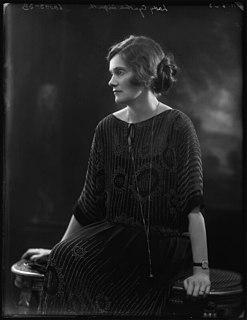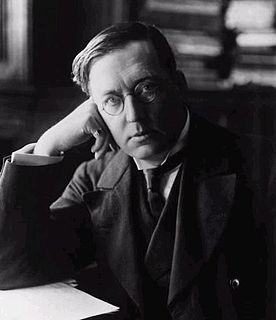
The undead are beings in mythology, legend, or fiction that are deceased but behave as if they were alive. A common example of an undead being is a corpse reanimated by supernatural forces, by the application of either the deceased's own life force or that of another being.
"Supernatural Horror in Literature" is a long essay by American writer H. P. Lovecraft, surveying the topic of horror fiction. It was written between November 1925 and May 1927 and revised during 1933–1934. It was first published in 1927 in the one-issue magazine The Recluse. More recently, it was included in the collection Dagon and Other Macabre Tales (1965).

Weird fiction is a subgenre of speculative fiction originating in the late 19th and early 20th centuries. John Clute defines weird fiction as a "Term used loosely to describe Fantasy, Supernatural Fiction and Horror tales embodying transgressive material". China Miéville defines weird fiction thus: "Weird Fiction is usually, roughly, conceived of as a rather breathless and generically slippery macabre fiction, a dark fantastic often featuring nontraditional alien monsters ." Discussing the "Old Weird Fiction" published in the late 19th and early 20th centuries, Jeffrey Andrew Weinstock says, "Old Weird fiction utilises elements of horror, science fiction and fantasy to showcase the impotence and insignificance of human beings within a much larger universe populated by often malign powers and forces that greatly exceed the human capacities to understand or control them." Weird fiction either eschews or radically reinterprets ghosts, vampires, werewolves, and other traditional antagonists of supernatural horror fiction. Weird fiction is sometimes symbolised by the tentacle, a limb-type absent from most of the monsters of European folklore and gothic fiction, but often attached to the monstrous creatures created by weird fiction writers such as William Hope Hodgson, M. R. James, and H. P. Lovecraft. Weird fiction often attempts to inspire awe as well as fear in response to its fictional creations, causing commentators like Miéville to say that weird fiction evokes a sense of the numinous. Although "weird fiction" has been chiefly used as a historical description for works through the 1930s, the term has also been increasingly used since the 1980s, sometimes to describe slipstream fiction that blends horror, fantasy, and science fiction.

George Oliver Onions, who published under the name Oliver Onions, was a British writer of short stories and over 40 novels. He wrote in a variety of genres but is perhaps best remembered for his ghost stories, notably the highly regarded collection Widdershins and the widely anthologized novella "The Beckoning Fair One". He was married to the novelist Berta Ruck.

Sunand Tryambak Joshi, known as S. T. Joshi, is an American literary critic, novelist, and a leading figure in the study of H. P. Lovecraft and other authors of weird and fantastic fiction. Besides having written what critics such as Harold Bloom and Joyce Carol Oates consider to be the definitive biography of Lovecraft, I Am Providence: The Life and Times of H. P. Lovecraft, Joshi has prepared several annotated editions of works by Ambrose Bierce. He has also written on crime novelist John Dickson Carr and on Lord Dunsany, Algernon Blackwood and M. R. James, and has edited collections of their works, as well as collections of the best work of numerous other weird writers.

Alfred Edgar Coppard was an English writer, noted for his influence on the short story form, and poet.

Lady Cynthia Mary Evelyn Asquith was an English writer and socialite, now known for her ghost stories and diaries. She also wrote novels and edited a number of anthologies, as well as writing for children and on the British Royal family.

A ghost story may be any piece of fiction, or drama, that includes a ghost, or simply takes as a premise the possibility of ghosts or characters' belief in them. The "ghost" may appear of its own accord or be summoned by magic. Linked to the ghost is the idea of "hauntings", where a supernatural entity is tied to a place, object or person. Ghost stories are commonly examples of ghostlore.

Occult detective fiction combines the tropes of detective fiction with those of supernatural horror fiction. Unlike the traditional detective, the occult detective is employed in cases involving ghosts, curses, and other supernatural elements. Some occult detectives are portrayed as being themselves psychic or in possession of other paranormal powers.
Herbert Russell Wakefield (1888–1964) was an English short-story writer, novelist, publisher, and civil servant chiefly remembered today for his ghost stories.
Jack Sullivan is an American literary scholar, professor, essayist, author, editor, musicologist, concert annotator, and short story writer. He is one of the leading modern figures in the study of the horror genre, Alfred Hitchcock, and the impact of American culture on European music.
The Ghost Story Society was a not-for-profit literary society whose members shared an interest in supernatural fiction. Founded in Britain in 1988 by Rosemary Pardoe, Jeffrey Dempsey, David Cowperthwaite and Mark Valentine, it had an international membership and was later administered by joint organizers Christopher Roden and Barbara Roden, owners of Ash-Tree Press, with the assistance of David G. Rowlands, Richard Dalby, Jan Arter, and Roger Dobson. It has not been active since 2007.
Everett Franklin Bleiler was an American editor, bibliographer, and scholar of science fiction, detective fiction, and fantasy literature. In the late 1940s and early 1950s, he co-edited the first "year's best" series of science fiction anthologies, and his Checklist of Fantastic Literature has been called "the foundation of modern SF bibliography". Among his other scholarly works are two Hugo Award–nominated volumes concerning early science fiction—Science-Fiction: The Early Years and Science-Fiction: The Gernsback Years—and the massive Guide to Supernatural Fiction.

Henry St. Clair Whitehead was an Episcopal minister and author of horror fiction and fantasy
Margery Lawrence was an English romantic fiction, fantasy fiction, horror fiction and detective fiction author who specialized in ghost stories.
Michael Raymond Donald Ashley is a British bibliographer, author and editor of science fiction, mystery, and fantasy.
"The Willows" is a novella by English author Algernon Blackwood, originally published as part of his 1907 collection The Listener and Other Stories. It is one of Blackwood's best known works and has been influential on a number of later writers. Horror author H.P. Lovecraft considered it to be the finest supernatural tale in English literature. "The Willows" is an example of early modern horror and is connected within the literary tradition of weird fiction.
Tales of Mystery was a British supernatural television drama anthology series based on the short stories of Algernon Blackwood. It was broadcast by ITV (Associated-Rediffusion) and ran over three seasons from 1961-1963. Produced by Peter Graham Scott, each episode was 25 minutes long and introduced by John Laurie. None of the 29 episodes broadcast survive in any television archive, however.
The Wendigo is a novella by Algernon Blackwood, first published in The Lost Valley and Other Stories.















